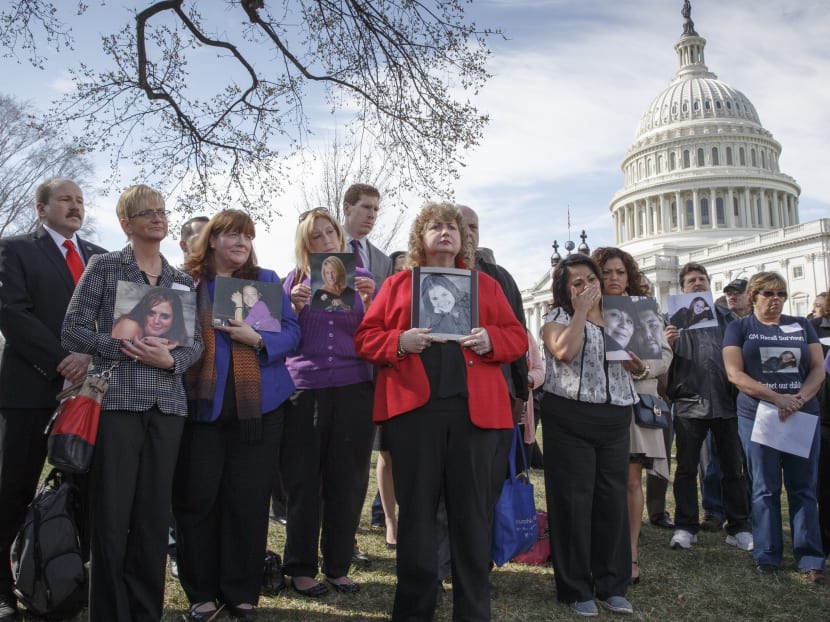Fix for GM defects costs more than just money
WASHINGTON — The families of those who died in General Motors cars with defective ignition switches want prosecutors to go after GM insiders responsible for letting the problems fester for more than a decade — and perhaps for covering them up.

Families of victims of General Motors safety defects hold photos of their loved ones as they gather on the lawn on Capitol Hill in Washington on April 1, 2014. Photo: AP
WASHINGTON — The families of those who died in General Motors cars with defective ignition switches want prosecutors to go after GM insiders responsible for letting the problems fester for more than a decade — and perhaps for covering them up.
“The only way the public is going to be protected from this negligence by companies is if there will ultimately be prison sentences,” said Mr Leo Ruddy, whose 21-year-old daughter Kelly was killed in 2010 when her Chevrolet Cobalt veered inexplicably off the highway and crashed.
Family members attended hearings in Washington last week that stoked those sentiments. Lawmakers confronted GM CEO Mary Barra with what they said was evidence that, in 2006, a company employee intentionally tried to conceal the switch problem. And the head of the nation’s auto safety watchdog said GM withheld critical information that connected the failing switch to air bags that didn’t deploy in a crash.
“I don’t see this as anything but criminal,” said Sen Kelly Ayotte, a former state prosecutor.
However, even if an employee or employees did conceal information, it’s uncertain whether they would be charged with a crime. Legal experts say it’s easier to prove wrongdoing by a corporation than by individuals. The internal documents that can be used to build a case against the company might be inadmissible as evidence against individuals. And it can be hard to prove that individuals knowingly made false statements.
The Justice Department didn’t bring charges against any individuals last month when it closed a year long investigation of Toyota.
GM has acknowledged that in 2004 and 2005, engineers submitted proposals to fix the switches in Cobalts, Saturn Ions and other small cars, but the fixes were never implemented. GM says upper management only became aware of the problem last year. A recall of the small cars, now up to 2.6 million vehicles, began in February.
On Wednesday, Sen Claire McCaskill, accused one GM employee of a cover-up. Mr Ray DeGiorgio, the lead switch engineer on the Cobalt, said in a deposition last year for a lawsuit against GM that he never approved a change to the ignition switch. But Ms McCaskill produced a document from GM’s switch supplier that showed Mr DeGiorgio signed off on a replacement, but with the same part number. Failing to change a part number makes the part harder to track.
Appearing yesterday on ABC’s This Week, Ms McCaskill said, “There is no reason to keep the same part number unless you’re trying to hide the fact that you’ve got a defective switch out there that in fact ended up killing a number of people on our highways.”
The Justice Department hasn’t confirmed that it’s investigating General Motors, but a person familiar with the case said the probe is underway. The person didn’t want to be identified because the investigation is private.
Two weeks ago, the Justice Department socked Toyota with a US$1.2 billion (S$1.5 billion) penalty over its recall of millions of vehicles for unintended acceleration. But no individuals were charged, even though prosecutors discovered that some managers sought to conceal problems with gas pedals in certain cars.
Proving individual guilt beyond a reasonable doubt is much harder than prosecuting a company based on the collective knowledge of all its employees. “To charge an individual, you have to show that one individual acted illegally by himself,” Mr Matt Axelrod, a former federal prosecutor now in private practice in Washington said.
GM took the car’s event data recorder, and only recently returned it after the family contacted a Pennsylvania senator for help. The contents are now being analysed, and the family will be looking to see the position of the ignition switch, Mr Ruddy said.
Mr Ruddy says the family is considering a lawsuit against GM but has yet to file one. A family friend who is an attorney is advising them on their next steps.
Mr Ken Rimer, whose stepdaughter died in a 2006 accident after a faulty switch prevented air bags from deploying, and his wife have already filed a lawsuit against GM. He’s worried that GM might be legally protected from lawsuits arising from decisions it made before its 2009 bankruptcy.
“No money will ever bring my wife’s daughter back,” he said. But “unless there’s a consequence for them doing something wrong, what’s going to stop them from doing something wrong again?” AP






